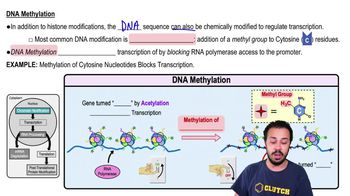Eukaryotic Chromatin Modifications definitions Flashcards
 Back
BackTerms in this set (22)
Eukaryotic Cells
with a nucleus and membrane-bound organelles, allowing compartmentalization of functions and complex regulation of gene expression.
Chromatin
DNA-protein complex in eukaryotic cells, consisting of DNA wrapped around histone proteins, which can be modified to regulate gene expression by altering its structure between tightly packed and loosely packed forms.
Modifications
Changes to chromatin structure, such as histone acetylation or DNA methylation, that regulate gene expression by altering transcriptional activity.
Eukaryotes
Organisms with cells containing a nucleus and membrane-bound organelles, allowing complex regulation of gene expression and chromatin modifications.
Gene Expression
The process by which information from a gene is used to synthesize functional gene products, such as proteins, often regulated by chromatin modifications affecting transcriptional activity.
Nucleosomes
DNA wrapped around eight histone proteins, forming the basic unit of chromatin structure, which regulates gene expression by altering DNA accessibility.
Histone Proteins
Proteins around which DNA wraps to form nucleosomes, playing a key role in chromatin structure and gene regulation through modifications like acetylation and methylation.
Transcription
The process of copying a segment of DNA into RNA, primarily mRNA, by RNA polymerase, enabling gene expression.
Histone Modifications
Chemical changes to histone proteins that affect chromatin structure and gene expression, leading to either activation (euchromatin) or repression (heterochromatin) of transcription.
DNA Sequence Modifications
Chemical changes to DNA or histones that alter chromatin structure, impacting gene expression by either promoting or inhibiting transcription.
Heterochromatin
A tightly packed form of chromatin with low transcriptional activity, preventing gene expression by making DNA inaccessible to transcriptional machinery.
Euchromatin
A loosely packed chromatin region with high transcriptional activity, allowing RNA polymerase easy access to DNA for gene expression.
Genome
The complete set of an organism's DNA, including all of its genes and non-coding sequences, that contains the instructions for building and maintaining that organism.
Transcriptional Activity
The level of gene expression regulated by the accessibility of chromatin to transcription machinery, influenced by chromatin modifications like histone acetylation and DNA methylation.
Transcriptional Machinery
The complex of proteins and enzymes, including RNA polymerase, that binds to DNA to initiate and regulate the transcription of genes into RNA.
RNA Polymerase
An enzyme that synthesizes RNA from a DNA template during transcription, crucial for gene expression regulation.
Nucleus
The control center of a eukaryotic cell, housing genetic material and coordinating activities like growth, metabolism, and reproduction.
Histone Acetylation
The addition of acetyl groups to histones, leading to a relaxed chromatin structure and increased gene transcription by allowing RNA polymerase easier access to DNA.
Acetyl Groups
Functional groups added to histones, loosening chromatin structure, enhancing RNA polymerase access, and increasing gene transcription.
Chromatin Structure
The arrangement of DNA and histone proteins into a compact, regulated structure that influences gene expression by altering accessibility for transcription machinery.
Promoter
A DNA sequence where RNA polymerase and transcription factors bind to initiate transcription of a gene.
DNA Methylation
The addition of methyl groups to DNA, typically at cytosine bases, which can repress gene transcription by altering chromatin structure and preventing transcriptional machinery access.



